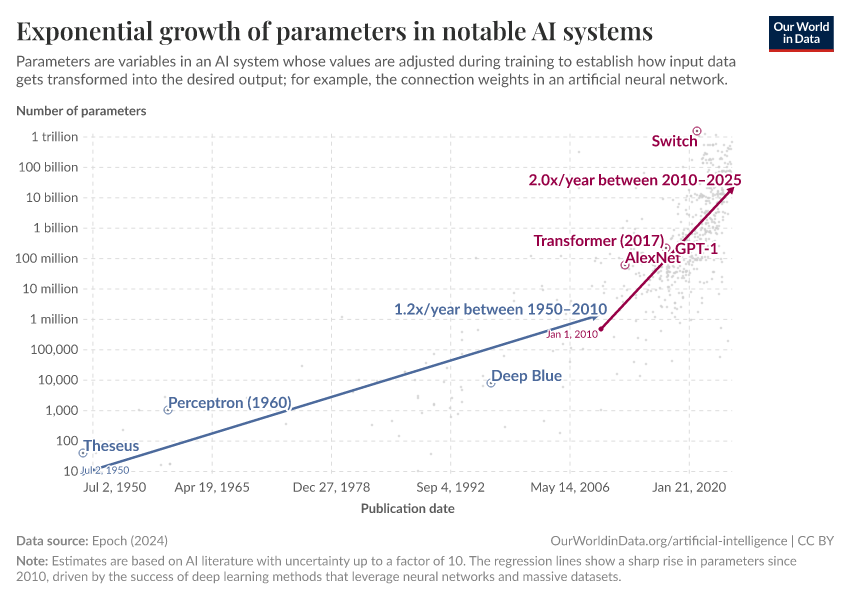Exponential growth of parameters in notable AI systems

What you should know about this indicator
- Parameters are internal variables that machine learning models adjust during their training process to improve their ability to make accurate predictions. They act as the model's "knobs" that are fine-tuned based on the provided data. In deep learning, a subset of artificial intelligence (AI), parameters primarily consist of the weights assigned to the connections between the small processing units called neurons. Picture a vast network of interconnected neurons where the strength of each connection represents a parameter.
- The total number of parameters in a model is influenced by various factors. The model's structure and the number of “layers” of neurons play a significant role. Generally, more complex models with additional layers tend to have a higher number of parameters. Special components of specific deep learning architectures can further contribute to the overall parameter count.
- Understanding the number of parameters in a model is crucial to design effective models. More parameters can help the model understand complex data patterns, potentially leading to higher accuracy. However, there's a fine balance to strike. If a model has too many parameters, it risks memorizing the specific examples in its training data rather than learning their underlying patterns. Consequently, it may perform poorly when presented with new, unseen data. Achieving the right balance of parameters is a critical consideration in model development.
- In recent times, the AI community has witnessed the emergence of what are often referred to as "giant models." These models boast an astounding number of parameters, reaching into the billions or even trillions. While these huge models have achieved remarkable performance, they have a significant computational cost. Effectively managing and training such large-scale models has become a prominent and active area of research and discussion within the AI field.
Related research and writing
What you should know about this indicator
- Parameters are internal variables that machine learning models adjust during their training process to improve their ability to make accurate predictions. They act as the model's "knobs" that are fine-tuned based on the provided data. In deep learning, a subset of artificial intelligence (AI), parameters primarily consist of the weights assigned to the connections between the small processing units called neurons. Picture a vast network of interconnected neurons where the strength of each connection represents a parameter.
- The total number of parameters in a model is influenced by various factors. The model's structure and the number of “layers” of neurons play a significant role. Generally, more complex models with additional layers tend to have a higher number of parameters. Special components of specific deep learning architectures can further contribute to the overall parameter count.
- Understanding the number of parameters in a model is crucial to design effective models. More parameters can help the model understand complex data patterns, potentially leading to higher accuracy. However, there's a fine balance to strike. If a model has too many parameters, it risks memorizing the specific examples in its training data rather than learning their underlying patterns. Consequently, it may perform poorly when presented with new, unseen data. Achieving the right balance of parameters is a critical consideration in model development.
- In recent times, the AI community has witnessed the emergence of what are often referred to as "giant models." These models boast an astounding number of parameters, reaching into the billions or even trillions. While these huge models have achieved remarkable performance, they have a significant computational cost. Effectively managing and training such large-scale models has become a prominent and active area of research and discussion within the AI field.
Sources and processing
This data is based on the following sources
How we process data at Our World in Data
All data and visualizations on Our World in Data rely on data sourced from one or several original data providers. Preparing this original data involves several processing steps. Depending on the data, this can include standardizing country names and world region definitions, converting units, calculating derived indicators such as per capita measures, as well as adding or adapting metadata such as the name or the description given to an indicator.
At the link below you can find a detailed description of the structure of our data pipeline, including links to all the code used to prepare data across Our World in Data.
Reuse this work
- All data produced by third-party providers and made available by Our World in Data are subject to the license terms from the original providers. Our work would not be possible without the data providers we rely on, so we ask you to always cite them appropriately (see below). This is crucial to allow data providers to continue doing their work, enhancing, maintaining and updating valuable data.
- All data, visualizations, and code produced by Our World in Data are completely open access under the Creative Commons BY license. You have the permission to use, distribute, and reproduce these in any medium, provided the source and authors are credited.
Citations
How to cite this page
To cite this page overall, including any descriptions, FAQs or explanations of the data authored by Our World in Data, please use the following citation:
“Data Page: Exponential growth of parameters in notable AI systems”, part of the following publication: Charlie Giattino, Edouard Mathieu, Veronika Samborska, and Max Roser (2023) - “Artificial Intelligence”. Data adapted from Epoch AI. Retrieved from https://archive.ourworldindata.org/20260126-094752/grapher/exponential-growth-of-parameters-in-notable-ai-systems.html [online resource] (archived on January 26, 2026).How to cite this data
In-line citationIf you have limited space (e.g. in data visualizations), you can use this abbreviated in-line citation:
Epoch AI (2025) – with major processing by Our World in DataFull citation
Epoch AI (2025) – with major processing by Our World in Data. “Exponential growth of parameters in notable AI systems” [dataset]. Epoch AI, “Parameter, Compute and Data Trends in Machine Learning” [original data]. Retrieved February 15, 2026 from https://archive.ourworldindata.org/20260126-094752/grapher/exponential-growth-of-parameters-in-notable-ai-systems.html (archived on January 26, 2026).